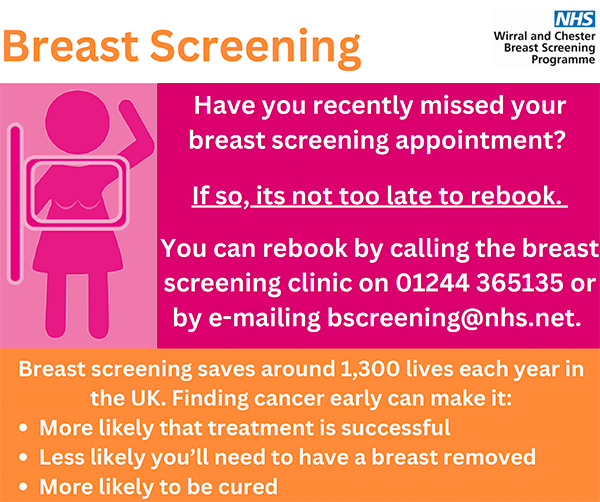Breast Awareness
Breast cancer is the most common type of cancer in the UK. Most women diagnosed with breast cancer are over the age of 50, but younger women can also get breast cancer.
- About 1 in 8 women are diagnosed with breast cancer during their lifetime
- There is a good chance of recovery if it’s detected at an early stage

For this reason, it’s vital that women check their breasts regularly for any changes and always have any changes examined by a GP.

Self examination
There is no right or wrong way to check your breasts. Every woman’s breasts are different sizes and shapes, but it is important to know what looks and feels normal for you.
- It is normal to have one breast larger than the other and to have tender, lumpier breasts towards the time of your period
- After the menopause, breasts may become softer, less firm, and not as lumpy
- Report any changes to your GP. Breast changes can happen for many reasons and lots of women have breast lumps, and most are not cancerous but it is important to seek a review from your doctor if you develop any changes that are not normal for you are not normal for you.
- The earlier cancer is diagnosed, the easier it is to treat.
Be Breast Aware
Follow the NHS Breast Screening Programme’s 5-point plan
- Know what is normal for you
- Look at your breasts and feel them
- Know what changes to look for
- Report any changes without delay
- Attend routine screening if you are aged 50-70
How and when?
Look and feel each breast up the armpit and collarbone
– Use a mirror to check with tour arms by your side and then above your head
You may find it easier to do in the shower, one a month
You may have lumpier breasts during your period, therefore you may wish to check yourself at a different time.
What to report
- Any change in size or shape
- Any change in the look or feel of the skin (e.g. puckering or dimpling, a rash or redness)
- New lumps, swelling, thickening or bumpy area in one breast or armpit that was not there before
- Nipple discharge or fluid
- Nipple rash (like eczema), crusting, scaly or itchy skin
- Any discomfort or pain in one breast, particularly if it’s a new pain and does not go away (although pain alone occurs in rare cases)
Screening
- Breast screening aims to find breast cancers early.
- It uses an X-ray (called a mammogram) that can spot cancers when they’re too small to see or feel
- All women aged from 50 to their 71st birthday who are registered with a GP are automatically invited for breast screening every 3 years
– You should receive your first invite between the ages of 50 and 53. Please contact the surgery if you do not receive an invitation
If you notice that your breasts look or feel different from what’s normal for you, do not wait to be offered screening, see your GP.
Support & Resources
- For more information on Breast screening: Breast cancer screening
- Keep Yourself Health: A Guide to Examining Your Breasts
- A Video Guide to Examining Your Breasts
If you have recently been diagnosed with breast cancer, Cancer Research UK has helpful links to support groups and agencies, which you may find useful.
Page last updated: 10 December, 2024
